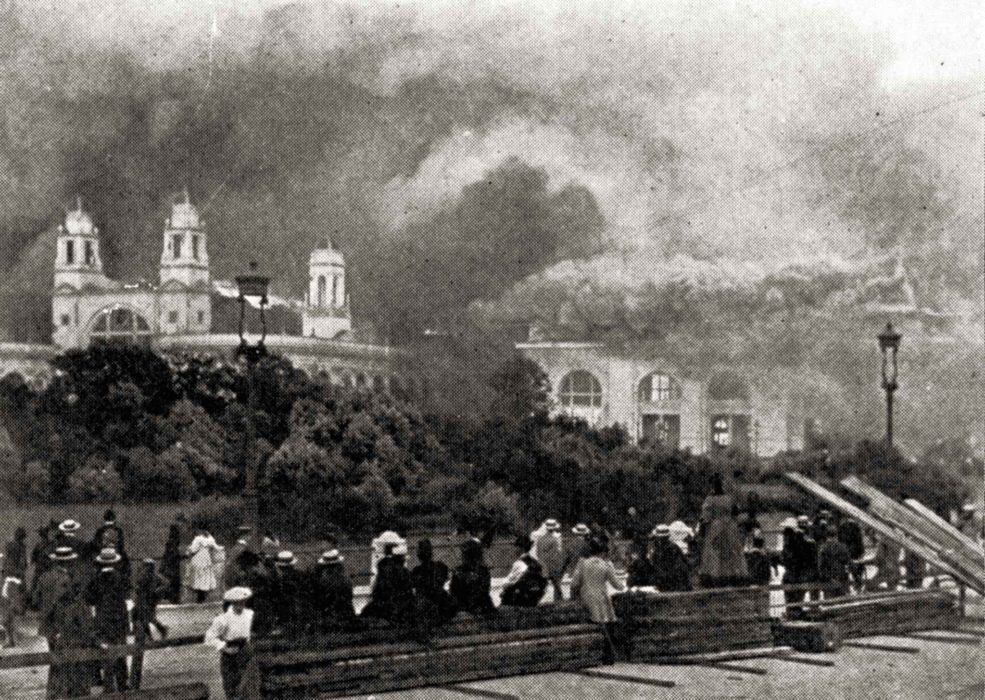‘ABDU’L-BAHÁ COULD HARDLY have picked a better time than 1912 to join the conversation about America. “Nineteen twelve,” said Eugene Debs, the Socialist Party’s candidate for President, “is a year supreme with possibilities.” That year marked the highpoint of a flurry of new social movements that had begun two decades earlier.
The ingenuity and growing industrial power of the United States had been on show at the World’s Columbian Exposition in Chicago in 1893. The palaces of the White City symbolized the economic transformation of John Winthrop’s “City on a Hill” into a global industrial power that was prepared to extend its influence across the world. But on January 8, 1894, just three months after the fair closed, flames swept through the monuments in Jackson Park.
The roof of the Manufactures Building collapsed in a mass of molten glass. The eastern end of the Court of Honor was now a blackened heap. The Electricity Building went up in smoke, while thousands of bystanders watched a barrage of light that dwarfed the pyrotechnics that twenty-seven million visitors had come to the Fair the previous summer to see. “Athens has crumbled; the chief attraction of the White City has resolved itself into ashes.”

The neoclassical palaces had been grand, but they had been lies: they were made of plaster of Paris supported on shoddy wooden frames to project grandiosity at minimal cost. Such, too, was the country Americans of the era found themselves living in. By the time the fair ended, the Panic of 1893 was in full swing. The Pullman railroad car works laid off more than eighty percent of its workers; the Illinois Steel Company went bankrupt, as did 350 banks. Farm prices plummeted. The national unemployment rate stood at twenty-five percent.
It was more than just a downturn: the very fabric of the American Dream was at stake. Middle-class Americans felt they had lost control of their lives to a few men named Morgan, Rockefeller, or Carnegie. Their fate was now determined largely by distant managers: impersonal forces they could neither see, nor understand, nor control. Meanwhile, they watched as conglomerates bought members of Congress and used federal power to enforce the status quo. When a strike against the Pullman Car Company reached Chicago in the summer of 1894, President Cleveland sent in federal troops to squash it. “Men became economic slaves,” Benjamin Parke De Witt wrote. “Slowly, Americans realized they were not free.”
Their response: a multifaceted approach to national reform that became known as the Progressive Movement. Settlement houses like Jane Addams’s Hull House sprang up to help solve the problems of the urban poor. Reformers enlisted the new sciences of statistics, economics, sociology, and psychology to investigate the laws that governed human behavior. Advocates of the Social Gospel lined up Protestant churches on the side of the poor. Muckraking journalists shaped a new social force — public opinion — by exposing the injustices of industrial capitalism. Progressive politicians fought the status quo by campaigning for government intervention in the laissez-faire economy on behalf of The People.

As ‘Abdu’l-Bahá crossed the country in 1912, the national debate around the Presidential election crystallized the forces of change that had been brimming for twenty years. Woodrow Wilson summed up the challenge facing the American people.
“Now this is nothing short of a new social age,” he said, “a new era of human relationships, a new stage-setting for the drama of life.”






